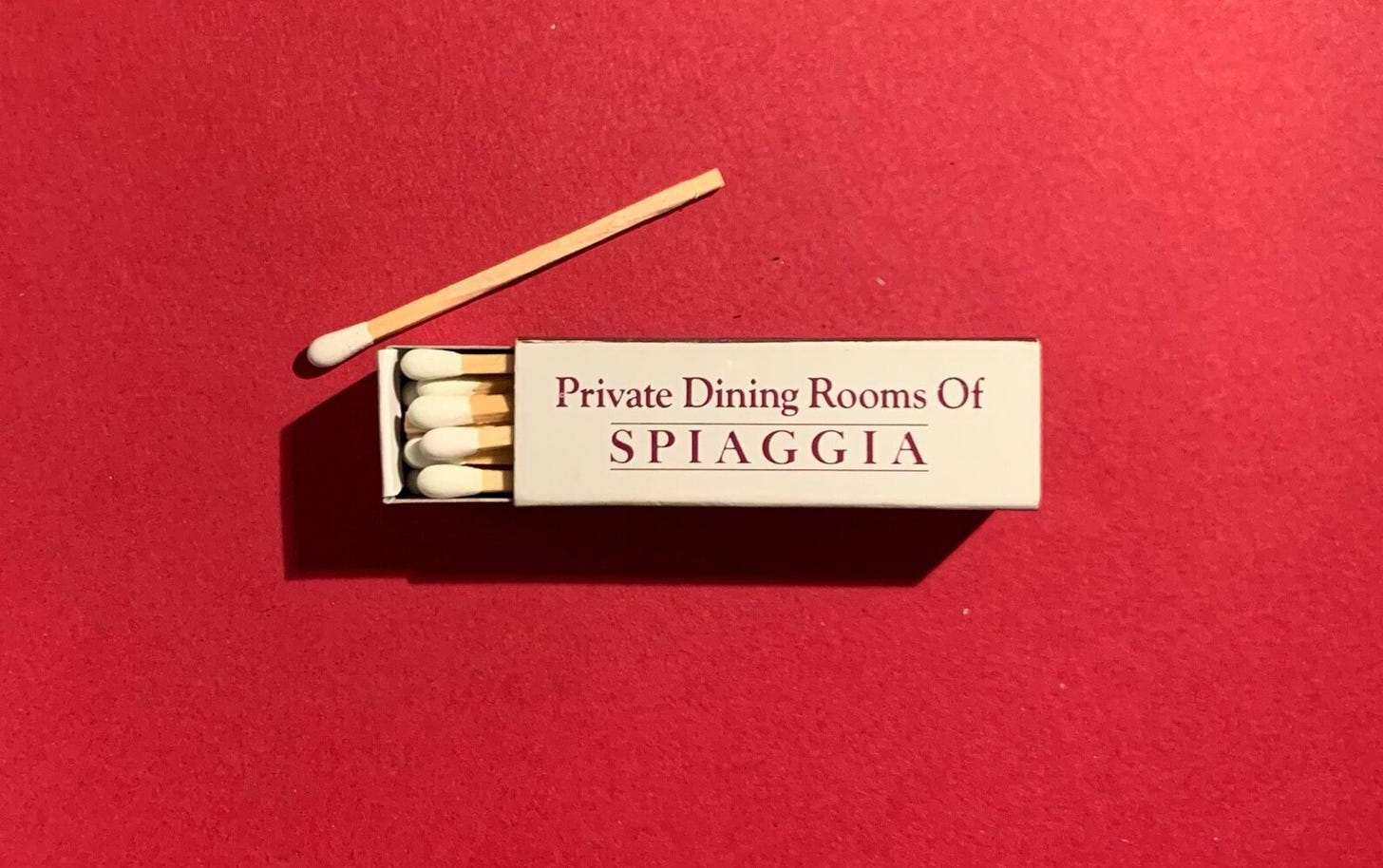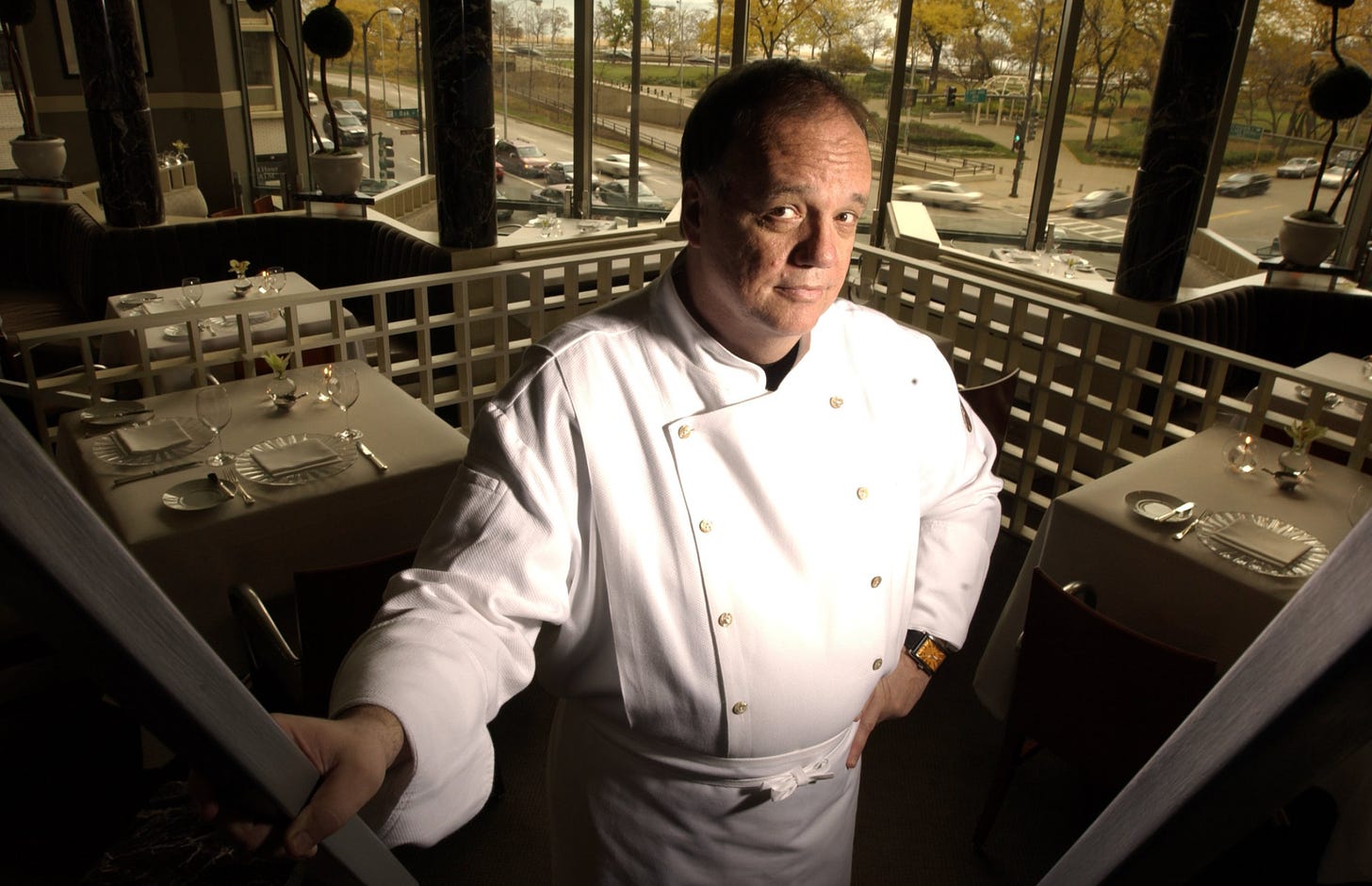It Didn’t Happen By Accident: Spiaggia
Missy Robbins and others reminisce over the Chicago icon whose food once inspired Sir Paul McCartney to personally thank every single line cook
Welcome to It Didn’t Happen By Accident, a series in which we look back at legendary restaurants and the tactics that took them to the top. In this edition, writer and former Food + Wine Features Editor Nina Friend talks to the alums behind Chicago’s Italian icon Spiaggia.
In 1984, when Spiaggia opened on the corner of Oak Street and Michigan Avenue in Chicago, chef Tony Mantuano couldn’t find fresh basil. So he decided to grow his own. For years, Mantuano kept a storage room in the back of the restaurant lined with grow lights and basil plants – a practice that, in today’s world, might almost seem passé, but back then, felt cutting-edge, even quirky. This obsessive pursuit of perfection powered Spiaggia’s rise to the top of America’s culinary scene. For 37 years, the fine dining Italian restaurant was a destination for dinner in the Windy City, beloved both by locals and celebrities, from Barack Obama to Billy Joel.
From the beginning, Spiaggia set out to do something different. The real estate developer Larry Levy was building 980 North Michigan Avenue, also known as One Magnificent Mile, and wanted to create a restaurant overlooking Lake Michigan. In a moment when Italian food in America meant spaghetti and meatballs, Levy could’ve created a French spot. Instead, he pursued elevated Italian, and named the restaurant-to-be Spiaggia, or beach, for its perch atop Oak Street Beach.
“You want to stack the deck against yourself? Open up a restaurant on the second floor of an office building,” said Andy Lansing, CEO of Levy Restaurants. “Well, we did. And it just sort of clicked. People went nuts over Spiaggia because it was so different and so beautiful and it wasn't pretentious.”
Before opening, in 1983, Levy sent Mantuano and his wife, Cathy, to cook in Italy for a year. At their first stop, in Milan—a restaurant Mantuano described as “a jolting mom and pop, screaming at each other and throwing things”—he figured out what he didn’t want Spiaggia to be. At the next spot—a restaurant right outside of Milan called Dal Pescatore, which has held three Michelin stars since 1966—Mantuano found inspiration and lifelong friends. “It was profound, the way everything was local,” Mantuano said. “We were struck by how few ingredients there were on the plate.”
“Tony was doing something different that didn’t exist anywhere else,” Robbins said. On the surface, that meant cooking everything over wood and charcoal, long before that was cool. “To be cooking every protein in wood ovens the way we did, and in a high rise building, it's pretty insane,” Grueneberg said.
Mantuano brought the Dal Pescatore philosophy back with him to Chicago, and started crafting Spiaggia around the idea of “la bella figura” – an Italian adage that reflects grace, class, and making a good impression. Spiaggia was exactly that: high-end but inviting, a place with gracious hospitality and impeccable standards. “There were great Italian restaurants in Chicago at the time, but they were like driving a Fiat,” Mantuano said. “And Spiaggia felt like you were driving a Ferrari.”
Beyond Spiaggia itself, Mantuano also operated a private dining room space as well as a more casual counterpart, Cafe Spiaggia, right next door. “Our goal was always to have the cafe be a more approachable version,” Lansing said. “Spiaggia was the special occasion, gorgeous, wonderful, oh my god restaurant, and Cafe Spiaggia you could go to multiple times a year.”
The Mentor and his Band
Both restaurants lasted as long as they did in part because Mantuano had an eye for talent; Spiaggia’s lineage of chefs includes Missy Robbins, Sarah Grueneberg, and Joe Flamm. (And Charlie Trotter even staged there for a few weeks around 1987, long before anyone knew who he would become.) But finding great people can only go so far. Once Mantuano’s apprentices were ready for the next step, he was able to pull back and let them shine. “He had a style, but within that style he also let people develop their own styles,” said Missy Robbins, chef/owner of Lilia and Misi in New York. Robbins worked at Spiaggia from 2003 to 2008, a time she called “the most formative five years of my career.”
At Spiaggia, Robbins dove deep into Italy’s cuisine, honing her creativity and learning about herself as a chef, a leader, and a person. She describes Mantuano as genuine, calm, and an incredible teacher. “Tony cultivated an environment where he let people be themselves and figure stuff out,” Robbins said. “He’s just the greatest mentor anyone could ever possibly ask for.”
Sarah Grueneberg, chef/partner of Monteverde Restaurant and Pastificio in Chicago, called Spiaggia “the perfect training camp to learn and understand Italy.” She worked there for eight years, from 2005 to 2013, and credits Spiaggia—and Mantuano—with teaching her everything she knows about Italian cuisine. “Tony pushed really hard to be as Italian as possible,” Grueneberg said. “He was dedicated to keeping it consistent, high level, and true to Italy.”
When Mantuano promoted Grueneberg to chef de cuisine, he sent her to stage at Dal Pascatore, just like he’d done. That trip became a right of passage for all of Spiaggia’s chefs de cuisine thereafter. For Grueneberg, 26 years old and in Italy for the first time, the experience was her “light bulb, flip the page, mic drop moment.” Today, Grueneberg melds that strict Italian training with Midwestern ingredients and her own personal twists. “What we do at Monteverde is the next chapter Spiaggia started,” she said. “Our meatball is not Tony's meatball, but it's greatly inspired by his grandmother’s meatball that he taught me how to make.”
Robbins left Spiaggia with a similar commitment to tradition. “If you were gonna make a bolognese, it wasn’t a duck bolognese, it wasn't a lamb bolognese, it was bolognese, and it was made in a very refined way to elevate it to four star cuisine,” she said. That deep respect for Italian culture, coupled with Mantuano’s obsessiveness about sourcing the best-quality ingredients, gave Spiaggia its strong culinary identity.
Some things about Spiaggia evolved over the years—the dress code eventually relaxed, and the white tablecloths went away—but the quality of the food always remained top-notch. “The concept through all of these wonderful chefs of let's buy the greatest ingredients, let's be simple, was really a key to Spiaggia’s long-term success,” Lansing said. There was also an awareness that the menu needed to stay balanced. While there was room for growth and new ideas, customers would never stop ordering the signature gnocchi, and at the end of the day, Levy, Mantuano, and the kitchen team wanted to make people happy.
Point in case: when Paul McCartney came to Spiaggia, having made a reservation under a fake name, Mantuano recalled that the server was a bit flustered. McCartney was vegan, and much of Spiaggia’s menu was not. Mantuano went out to talk to McCartney and said, “Just tell me some ingredients you like.” This was largely before the days of vegan tasting menus, but Mantuano put together a meal based on McCartney’s preferences. After finishing dinner, McCartney got up from his table, walked to the kitchen, and thanked every single line cook.
Paul McCartney might’ve brought some magic to the air that evening, but the thing about Spiaggia was that every night felt special – which all goes back to Mantuano’s original vision. “Tony was doing something different that didn’t exist anywhere else,” Robbins said. On the surface, that meant cooking everything over wood and charcoal, long before that was cool. “To be cooking every protein in wood ovens the way we did, and in a high rise building, it's pretty insane,” Grueneberg said.
Internally, Mantuano’s vision for Spiaggia manifested in the way his team connected with one another. “It’s a big family,” he said. And that’s as much metaphorical as it is literal: Grueneberg met her husband and business partner, Jaime Canete, working at Spiaggia. As for Robbins, she said she might never have left; the only drawback was that she didn’t want to live in Chicago forever. “If they would've opened in New York,” Robbins said, “I think I'd still be with Tony today.”
It’s impossible to say what a New York (or Miami or Vegas) version of Spiaggia might’ve looked like. Even before closing in July 2021—a pandemic-induced inability to find common ground with the landlord—there was never any appetite to open another Spiaggia. “You can't duplicate it,” Mantuano said.
To this day, Lansing still gets calls from people asking him to open another Spiaggia, many even offering to pay for and build it. “As tempting as it might be, I say the same thing to all of them: There was only one Spiaggia, and there's only going to be one Spiaggia. It was perfect, and I want everybody to remember it that way.”
Nina Friend is a New York-based writer who covers food, drink, restaurants, lifestyle, and sports. Find her on Instagram at @ninafriend.








Thanks for this article! I started my hospitality career with Spiaggia and need to second Missy's sentiment: my years there were absolutley the most formative time spent in any restaurant. Tony is the gold standard to what a Chef should be - humble, kind, nurturing and thoughtful. As a FOH team member, no question or request was met with annoyance or eye-rolling, he was a devoted edcuator about all things Italian. Being there to see Sarah and Joe rise through the ranks from Private Events to the Cafe to the Main Dining Room was incredible and a big shoutout to the FOH team that made the place hum. Carlos, Rita, Ernesto, Gustavo, Elvira, Jason, Chad, Orlando, Rachel, and so many other talented names that I'm forgeting. Saluté!